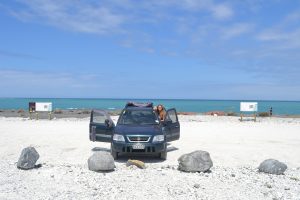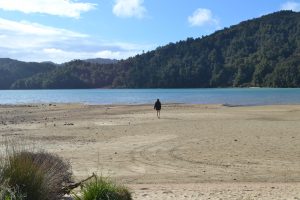Driving around New Zealand in a Honda CRV and calling it both your car and your home (as well as Max) is one person’s dream and another’s nightmare. If you need your home comforts (or have severe back issues), you might not think this is the best way to see a country. But if you’re looking for remoteness and unchartered territories, you need some wheels which can either be, or hold, your house.
For the last two weeks, Hayley and I have driven from the West Coast to the East, and then followed the coast down south for 350km. We had no place to be and no person to see; we just stopped whenever we found a spot we liked. It is maybe the freest you can feel, particularly when you end up sleeping beside a lake in the middle of rolling mountains, when that morning you didn’t even know such a place existed (Lake Tennyson, Hanmer Springs). It is also incredibly easy in many ways – a simple way of living. You have one pan; always the bare essentials – everything you own is inside one moving space.
For the most part, this road trip was a dream for both of us: we found beautiful towns and hills, swam with dolphins, climbed a mountain, jumped on a trampoline, made a prize-worthy cheese toastie in a pan…the list goes on. However, there are certain things about living in a car that make it difficult, including the fact that you do sometimes feel homeless. Most of these are fine short term, but breaking up a trip with a couple of nights in a hostel or B&B might do wonders. Hold out for the rainy days!
Number one: showering is limited. We stayed in holiday parks (also great but more expensive than some camp sites) when the nature washes in lakes weren’t doing the trick anymore. Washing clothes is also a challenge but again, most holiday parks have washing machines. Sometimes sacrificing a remote location for a few amenities is necessary. The plus side – you come out the other side with a great appreciation for showers!
Number two: when you don’t know camping etiquette. One of the free camping spots we stayed at in Kaikoura was really just a stony carpark next to the beach with a toilet. This night we walked 300 metres to brush our teeth because we weren’t sure whether we could spit our toothpaste on the ground, made worse by our clear visibility to the rest of the vans parked up. Washing up also becomes an issue when there’s no sink… The plus side – you only feel bad spitting because everywhere is so clean!
Number three: sleeping may cause more problems than it solves. This includes cramp, joint stiffness, and if you’re not careful, a lack of blood in your feet or head in the morning. Luckily for Hayley I made flat ground a serious priority when picking a spot for the night. Having a really comfy mattress and a larger space to sleep (like in a camper or caravan) would solve these issues. But campers are a lot more expensive and less prepared to tackle some of the unsealed roads in New Zealand. Cheap and cheerful (and crippled) was our motto. The plus side – restless nights are less of a problem when you have a 9pm bedtime anyway!
These are in no way enough to dampen the experience; in fact, sometimes they even add to the fun of it. They can just be a challenge at points. If you’re planning a few months on the road, a self-contained campervan might be the way to go. You don’t have to worry about water supply, and there are certain basic (and free) campsites which only allow self-contained vehicles. I can just say with certainty that for a full appreciation of New Zealand you need some wheels, and ones that aren’t afraid of a gravel track.

